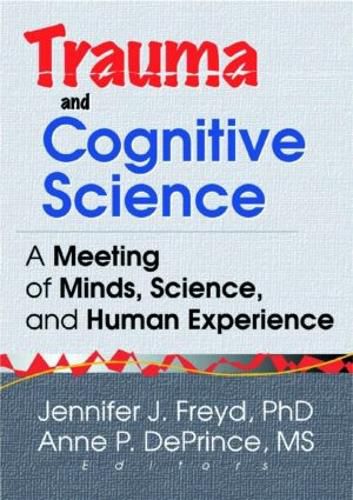Readings Newsletter
Become a Readings Member to make your shopping experience even easier.
Sign in or sign up for free!
You’re not far away from qualifying for FREE standard shipping within Australia
You’ve qualified for FREE standard shipping within Australia
The cart is loading…






Decipher the complex interplay of neurology, psychology, trauma, and memory!
In the midst of the controversies over how repressed, false, and recovered memories should be interpreted, Trauma and Cognitive Science presents reliable original research instead of rhetoric. This landmark volume examines the way different traumas influence memory, information processing, and suggestibility. The research provides testable theories on why people forget some kinds of childhood abuse and other traumas. It bridges the cognitive science and clinical approaches to traumatic stress studies.
Written by the foremost researchers in the field, including Bessel van der Kolk and Jennifer Freyd, these scientific evaluations of the way traumatic memories are processed offer powerful new perspectives on the interplay of biology and psychology. Trauma and Cognitive Science discusses a range of traumas, including combat, child abuse, and sexual assault across the lifespan. Fascinating perceptual experiments shed light on the cognitive uses of dissociation, the encoding and recall of memory, and the effects of early trauma on subsequent information processing.
Trauma and Cognitive Science also offers an astonishing array of true case studies, including the story of an adult woman who was raped, went to court, and saw her rapist convicted–and then forgot the whole traumatic episode. The independently corroborated accounts of recovered memories and the carefully designed research studies on multiple modes and levels of memory may offer the key to understanding how we remember and why we forget. The results of these controlled scientific studies have wide-ranging implications for abuse survivors, combat veterans, rape victims, and people who have survived traumatic events from earthquakes to car accidents.
Written in clear, accessible prose, Trauma and Cognitive Science belongs on the bookshelf of all mental health professionals, researchers in the areas of traumatic stress and child abuse, attorneys, judges, and survivors of abuse and trauma.
$9.00 standard shipping within Australia
FREE standard shipping within Australia for orders over $100.00
Express & International shipping calculated at checkout
Decipher the complex interplay of neurology, psychology, trauma, and memory!
In the midst of the controversies over how repressed, false, and recovered memories should be interpreted, Trauma and Cognitive Science presents reliable original research instead of rhetoric. This landmark volume examines the way different traumas influence memory, information processing, and suggestibility. The research provides testable theories on why people forget some kinds of childhood abuse and other traumas. It bridges the cognitive science and clinical approaches to traumatic stress studies.
Written by the foremost researchers in the field, including Bessel van der Kolk and Jennifer Freyd, these scientific evaluations of the way traumatic memories are processed offer powerful new perspectives on the interplay of biology and psychology. Trauma and Cognitive Science discusses a range of traumas, including combat, child abuse, and sexual assault across the lifespan. Fascinating perceptual experiments shed light on the cognitive uses of dissociation, the encoding and recall of memory, and the effects of early trauma on subsequent information processing.
Trauma and Cognitive Science also offers an astonishing array of true case studies, including the story of an adult woman who was raped, went to court, and saw her rapist convicted–and then forgot the whole traumatic episode. The independently corroborated accounts of recovered memories and the carefully designed research studies on multiple modes and levels of memory may offer the key to understanding how we remember and why we forget. The results of these controlled scientific studies have wide-ranging implications for abuse survivors, combat veterans, rape victims, and people who have survived traumatic events from earthquakes to car accidents.
Written in clear, accessible prose, Trauma and Cognitive Science belongs on the bookshelf of all mental health professionals, researchers in the areas of traumatic stress and child abuse, attorneys, judges, and survivors of abuse and trauma.